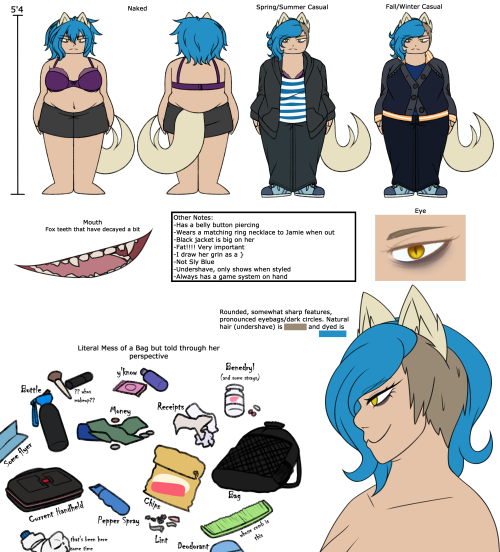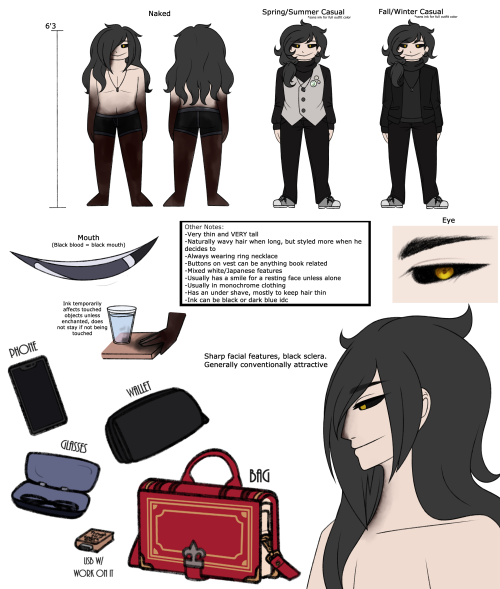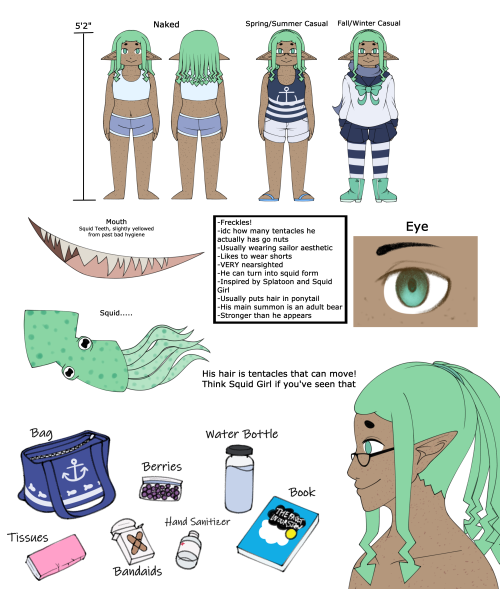#revoice
jamie ref sheet! he was fairly simple to do he doesn’t have much going on
i did do a throwback for his spring outfit!
Post link
I forgot to mention how I completely feel the Holy Spirit’s presence when I’m with other gay Christians. Revoice had chosen what I thought was a fitting theme song for the weekend.
“Oh How Good” — KEITH GETTY, KRISTYN GETTY, ROSS HOLMES, AND STUART TOWNEND © 2012
Oh how good it is
When the family of God
Dwells together in spirit
In faith and unity.
This was a chosenfamily (if you will, from Grant Hartley’s talk) of God. We not only chose God, but we chose to come together in Christ and our united experiences as LGBT and SSA Christians.
Where the bonds of peace,
Of acceptance and love
Are the fruit of His presence
Here among us.
Hundreds of SSA Christians are simply not accepted at their churches. How beautiful it is to finally be in a place where He is present, and acceptancesurrounds us. This acceptance and love was what drew me to Christ, but it was also what I feared not having because of my sexual orientation. Tears from this.
CHORUS
So with one voice we’ll sing to the Lord
And with one heart we’ll live out His word
Till the whole earth sees
The Redeemer has come
For He dwells in the presence of His people.
This was the theme of the conference. We are singing to revoice what has been told to us by those who don’t understand. We are singing to our Redeemer and coming as we are.
Oh how good it is
On this journey we share
To rejoice with the happy
And weep with those who mourn.
I couldn’t help but rejoice with those who are making strides in their churches, and it deeply, deeply pained me to hear stories of oppression and misunderstanding by others. Simply hearing how Christians could simply could not come out because they were mistreated or ignored made my heart ache. (Double weeping on my part from this verse).
For the weak find strength
The afflicted find grace
When we offer the blessing
Of belonging.
Offering the blessing of belonging had a huge impact on individuals I met. A couple of them had never met another gay Christian before. I know how lonely it feels to be the only gay person in a church.
Reckless Love - Cory Asbury, Caleb Culver, Ran Jackson © 2017
I’ve sung this song dozens of times, but I never realized what it means for LGB Christians:
Oh, it chases me down, fights ‘til I’m found, leaves the ninety-nine
This to me represent’s Christ’s love for the marginalized. Roughly 4% of American adults identify as LGBT. Yet the church often forgets we exists. Christ’s love doesn’t just settle with “well, at least I have the majority.” He chases down and loves every single one of his sheep.
There’s no shadow You won’t light up
Mountain You won’t climb up
Coming after me
There’s no wall You won’t kick down
No lie You won’t tear down
Coming after me
The shadow here for me was how dark the church feels when no one’s talking about LGBT people. It took me 8 years in church to finally hear a message on homosexuality. The lie that Jesus tore down was the lie that “you can’t be gay and be Christian.” My friends came from several churches who believed this lie, and I can’t stress enough how heartbroken I am when my friends hear this lie be preached over and over.
I’m not saying that these songs were written about LGBT people, but it’s so clear to me why and how God loves His LGBT children.
The Revoice committee put together a marvelous array of thoughtful and helpful workshops. Here is just a glimpse of the ones that I went to:
How to Become Churches that Cultivate Celibacy & Mixed-orientation Marriages
Pieter Valk of EQUIP
This one opened my eyes to how much more a church can support a Side B Christian. I was lucky enough that my first church after salvation was fully supporting of my same-sex attractedness. I was on a panel two years ago at church, and a question was asked to me “How can an LGBT person feel loved and accepted in the church?”. I replied that I already feel loved and to keep doing what it was doing. Boy, was I naive.
There are 5 basic things a church can do to make LGBT Christians feel more welcomed:
- Offer God’s narrative of sexual stewardship to all people. (When we leave out a group of people, our church is not whole.)
- Talk about the reality of SSA among Christians. (Churches shouldn’t have to be affirming or non-affirming. It should be loving or loving.)
- Start talking about this at an early age. (Average time between a teen coming out to themself and to a parent is 5 years.)
- Effectively minister to LGBT+ people. (You can’t outreach to the LGBT community without making our church safe and whole.)
- Become churches where people can thrive in celibacy and MoMs:
Practical steps for cultivating celibacy
- Model it - Children must see celibate people thriving and leading.
- Teach it - The Gospel isn’t an imitation of marriage. It’s an imitation of the Trinity. Jesus didn’t lift up celibacy for only just a few people. In the New Heaven and New Earth, everyone will be celibate anyway.
- Discern it - Unless 10% of straight Christians accept the call to celibacy, how will gay Christians be celibate?
- Support it - Invite celibate people to be in the body of Christ. Don’t just have married-couple events, but have church-wide events. Small groups should be multi-generational. Celibate Christians should be invited to a nuclear family. Go as far as inviting them into nuclear homes for dinners, vacations, and even habitation. Form celibate households (like contemporary monasteries?). It shouldn’t just take 2 people to raise 4 kids. It should take the whole village.
- Celebrate it - There are already so many celebrations for couples. Let’s highlight and celebrate our celibate brothers and sisters. Hold ceremonies for vows of celibacy.
Practical steps for cultivating mixed-orientation marriages
- Normalizethem - They are common and beautiful for those called to them. They were pushed for in the 80s-2000s, and pushes against in the 2000s-2010s. We only heard about the bad MoMs, but the good MoMs need to be cultivated and talked about more.
- Teachaccurately about marriage - which is emotional intimacy, vulnerability, commitment, and possibly raising children together. It isn’t necessarily about sexual attraction, romantic fulfillment, or companionship (and even secular sex therapists would agree about that).
- Amplifytheir stories - MoMs contain both beauty and brokenness.
- Cultivatecelibacy - a reminder that celibacy is an option instead of MoMs so that people don’t feel forced into MoMs.
If your churches are struggling to maintain Side B Christians in your church, this can help start a conversation. (Most of my notes just copied from Valk’s workshop).
Race and Intersectionality
I wasn’t planning on going to this panel, but I didn’t realize how much I needed it. (I’m not a racial minority. I don’t have any struggles about my race, right?) Intersectionality is the concept that the experiences and prejudice of one class of people is not enough to encompass a person who intersects from another class of people. Let’s dive in:
First we touched upon the differences between how cultures “come out.” White people expect a narrative of fear or misunderstanding, like how coming out is displayed on the big screen. Sueann Shiah recounted that her parents were quite nonchalant about it (Taiwan was the first Asian country to legalize same-sex marriage).
We then touched upon different viewpoints. Similar to Ron Belgau’s sentiment in the preconference, you can find unlikely allies with friends who have differing points of views. It keeps you in check, and people value those opinions.
In terms of the intersection between queer and Christian, I was relieved when I was reminded that there is no how-to guide to be a queer Christian. Sueann had to learn where her moral boundaries were by either pushing the boundary too far or sticking too close. I’ve been sort of doing the same thing these past few months. I was careful to make sure that I know the consequences of pushing boundaries.
We made the distinguishment between God’s law and man’s law. Sometimes it’s easy to blend the two. But it was at this panel I felt a tugging in my heart. I was assured that the image of God was goodness and that my heart for justice is from God. Of course, I was wary of how far I can go for social justice. The best piece of advice is: Do not invest in people who are not willing to invest in you. Likewise, do not try to teach people who you are not willing to learn from.
LGBT Culture and History
Grant Hartley deserved the standing ovation given after his workshop. Topic hotly debated, I am proud of his contribution to our LGBT Christian culture. Here’s a sneak peek before the video goes public:
- Sexual minorities (or LGBT+ SSA people) have unique needs and gifts.
- Sexual minorities produce a culture of belonging (that isn’t necessarily sexual).
- They have good, bad, and redeemable aspects, which are complex.
I want to focus on what he found about the second aspect of sexual minorities in history. Several LGBT groups throughout the decade were actually opposed to the overt sexualization of their communities. These include activists groups like the Mattachine Society (1950). In fact, the largest mass shooting of LGBT people in the US was in New Orleans in 1973. These people were attending a regular church meeting at a gay bar.
Unfortunately, entities like Anita Bryant, Jerry Falwell, and the Moral Majority used fear to silence and ridicule my people. I realize these victims were my ancestors - fighting and living to make America better for me. I owe my life to these strong members of my Chosen Family.
Here are my (scattered) closing thoughts from Revoice:
You should be loved as you are. Not as you should be.
Typically missionaries need to research a foreign country in order to love them. Straight Christians should do the same for LGBT people.
Likewise, God doesn’t call just one tongue to confess his name. God’s love needs to be shared in a person’s native language. LGBT people need to be in ministry.
People need to understand the different levels of coming out. There’s living “out and proud”, and there’s choosing life or death.
Churches need to separate sexual integrity/addiction ministries with sexual minority ministries.
Hugs are good. (I’m not trying to be silly. There is an important why God designed physical touch.)
And lastly, the burden of figuring out how to be an LGBT Christian shouldn’t be on the LGBT Christian. Allies should walk with us through our burdens, and this form of love trickles down to all Christians. Leaders should be calling out other leaders who are being ignorant of us. There should be public repentance if anyone uses the Lord’s word against us. We are simply examining and defining our lives, just as anyone else is, and we want to live our lives because God loved us.
Revoice was the first ever national conference that supports LGBT Christian who wish to live out a traditional sexual ethic. Spiritual Friendship is a community of several “Side B” Christians who want to explore ways to live out their faith in a way that is unique to their experiences. Here are some of my takeaway points from the Spiritual Friendship Pre-conference and Revoice Speakers.
Ron Belgau
My main takeaway points are introducing what spiritual friendship is. He mainly used David and Jonathan as an illustration of a committed friendship. These two men not only committed their lives, but also the lives of their kin, to one another. He emphasized how society can only see love in romance, but not in friendship. Christians in America need to look at how God views friendship if they want to learn to accept new ways to live out a life of love.
Johanna Finegan
This woman knows what’s up. She starts off reminding the audience that most people assume everyone wants to be fulfilled sexually and romantically. That’s what makes Side B gay Christians uncomfortable because it makes them feel like their choice to be celibate is wrong. “Homosexual” doesn’t mean a person is sexual. These Christians are just asking for pastoral care that is specific to their needs. Being a minority in the church means a lot of what is said in the pulpit will not apply to you. This group is shoved into the corners and into the shadows. Then the group meets at a conference in St. Louis and is surprised to learn that they are not alone in their experiences at church. In fact, we shouldn’t be shoving these people in corners. We should be looking to see how God is using those who are surrendering their sexuality to Him. These Christ-lovers are simply saying that there is something more worthy than their sexual and romantic lives.
To a critic who thought rejecting the call to marriage wasn’t manly, she responded that there is nothing unmanly about refusing to marry a woman by believing he won’t be a gift to her, than marrying in order to self-indulge, to hide, and to find passive acceptance in the church. Mic drop.
Brother Trout
Coming from a different perspective, Brother Trout shared his experiences about the changing values of morality from the present to future generations. As a high school teacher, he noticed that the “You can do anything you want to do!” mantra was causing kids to feel burdened, directionless, unsuccessful, unsure, and - in the end - complacent. On the flipside, limits (such as the limits that come with celibacy) define a clear narrative we can strive for. I was more struck by how much I could relate to the negative effects of that mantra.
Eve Tushnet
I was yearning to see a convert in the gay Christian community, and I’m glad to see this representation on stage. A “convert” is a Christian who didn’t grow up in the church but chose to follow Christ later on in life (that’s me!). Tushnet was shocked at why it was easier for gay converts to learn to praise Jesus than gay people who grew up in the church. Like others from the Spiritual Friendship blog, Tushnet was able to elevate the meaning of friendship by giving examples of David and Jonathan, as well as Ruth and Naomi. Straight Christians are afraid of the word “same-sex love”, but there it was in the Bible. It’s time to explore what God was trying to say with this form of friendship.
Ray Low
Yaas Asian American representation yass. “Life isn’t about what you can take from the world. It’s about what you can give.” I wholeheartedly agree with Low. The church NEEDS our voice. I owe it to him to kickstart me on this journey to share what I’ve learned with the world. I have something to say now, and I have an entire community who will back me up.
I just needed a place to dump my notes and thoughts from the conference. The Side B community needs to be heard, and the Church needs to support them. If you’d like to listen to these individuals who are leading the Side B dialogue, listen to their keynotes here.
First of I-don’t-know-how-many blog posts of my experience last week in St. Louis, MO. If you’ve never heard of Revoice Conference, it’s a safe space that supports, encourages, and empowers gay, lesbian, same-sex-attracted, and other LGBT Christians so they can flourish while observing the historic, Christian doctrine of marriage and sexuality. It’s the first time in human history that “Side B” Christians from all over the world can gather to worship, to fellowship, and to learn from one another.
This event really means a lot to me. I wish I had this 8 years ago when I was a closeted Christian! Although my experience as a gay Christian was mostly positive, I met dozens of Christians who either were closeted or rejected by their churches. Revoice was a powerful space to let us all worship in peace.
Before I go into the details of the conference, I want my readers to recognize the scope:

This map represents everyone I met at Revoice off the top of my head. Some of these places are very friendly towards LGBT and SSA people. Some are not. Most of these Christians have dedicated their lives to celibacy, in gratitude of their new lives in Christ. Yet some still are misunderstood by their Christian brothers and sisters, with whom they wish to walk along side as they strive to live for Jesus.
Oh how good it is
On this journey we share
To rejoice with the happy
And weep with those who mourn.
(lyrics from “Oh How Good”)
Those few days I was able to rejoice with those who were able to worship as they are, and I couldn’t help but weep with those who had to hide themselves from their families. (Real tears!)
It was beautiful to see how God was working through an oppressed group of people for His love to endure all obstacles. Join me as I recount some of the sweet, brave, and thought-provoking moments of Revoice.






